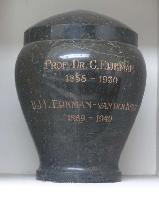Eijkman, Christiaan |
| HYGIENIST, BACTERIOLOGIST, PHYSICIAN (THE NETHERLANDS) |
|
BORN 11 Aug 1858, Nijkerk, Gelderland - DIED 5 Nov 1930, Utrecht GRAVE LOCATION Driehuis-Velsen, Noord-Holland: Begraafplaats en Crematorium Westerveld, Duin en Kruidbergerweg 6 (Columbarium 2 (inside), ashes) |
|
Christiaan Eijkmann was the son of a schoolmaster in Nijkerk. His elder brother Johann Frederik Eijkman (1851-1915) was a chemist. In 1859 the family moved to Zaandam. He entered the Military Medical School of the University of Amsterdam where has trained as a medical officer for the Netherlands Indies Army. Between 1879 and 1881 he was an assistant of professor T. Place and he obtained a honourary doctoral degree in 1883 for his thesis "On Polarization of the Nerves". In 1883 he married Aaltje Wigeri van Edema. In the same year he left for the Indies where he worked as a medical officer, first at Semarang and later at Tjilatjap on Java and at Padang Sidempoean on Sumatra. After he caught malaria he was forced to return to Europe on sick leave in 1885. His wife died in 1886 and in 1888 he married Bertha van der Kemp (1869-1949). Their son Peter Hendrik was born in 1890. Eijkman worked in Amsterdam for E. Forster and in Berlin at Robert Koch's laboratory. In 1887 he became the director of the laboratory of the Military Hospital in Batavia. He worked there until 1896 and studied the physiology of people living in tropical regions. He also studied the beriberi disease and accidentally discovered that eating unpolished rice instead of polished rice prevented the development of the disease. Ill heath forced him to abandon his research, but Adolphe Vorderman took it further and finally it was established that the crucial component was vitamin B. In 1898 he was appointed Professor in Hygiene and Forensic Medicine at Utrecht. He conducted research on bacteriology and developed a fermentation test to determine if water was pollluted by defecation of humans or animals. In 1907 he became a member of the Royal Netherlands Academy of Arts and Sciences. He was also a member of the Gezondheidsraad (Health Council) and fought against alcoholism and tuberculosis. In 1929 he was awarded the Nobel Prize for his contributions to the discovery of antineuritic vitamins. He died in 1930 in Utrecht. Related persons • was painted by Veth, Jan |
| Images |
Sources • Christiaan Eijkman - Wikipedia (EN) |



